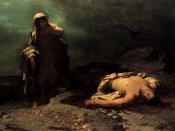Aristotle created what he believed to be the definition of a tragedy. It consists of three parts: imitation, catharsis, and a tragic hero. One example of a tragedy written during the classical Greek period was the tale Antigone, by the playwright Sophocles. As the daughter of Oedipus, Antigone already has a curse upon her family when she sets out to bury her brother, Polynices, against the wishes of Kreon, her uncle and king. In response, he condemns her to be buried alive in a cave and she decides to hang herself instead of enduring the slow death. As a consequence, Kreon loses his wife and son and is left to rule alone. Even with this plot, it is argued that Antigone is not a tragedy because it does not fit into Aristotle's mold like Oedipus the King does and therefore has not become as classic of an example of tragedy.
Proving that Antigone is not a tragedy consists of evidence from all three parts of Aristotle's guidelines. In the category of catharsis, Antigone does not bring about a feeling of pity to the reader; she brought the penalty upon herself because she knew what the consequences were for flouting the king. "I will bury him myself. / If I die for doing that, good: / I will stay with him, my brother; / and my crime will be my devotion. / The living are here, / but I must please those longer / who are below; for with the dead / I will stay forever" (Antigone 87-94). Antigone makes the choice even though she fully knows the consequences; she sees a greater reward for her in the afterlife. In addition, the reader does not experience a purification of their emotions because there are no intense emotions of pity.


